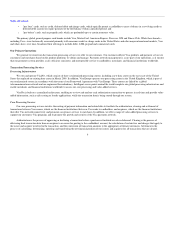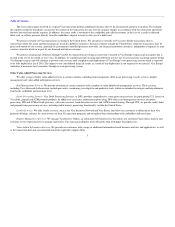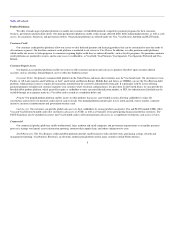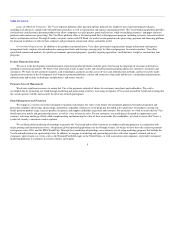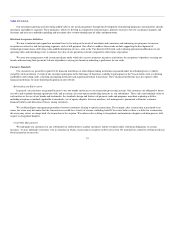Visa 2009 Annual Report Download - page 17
Download and view the complete annual report
Please find page 17 of the 2009 Visa annual report below. You can navigate through the pages in the report by either clicking on the pages listed below, or by using the keyword search tool below to find specific information within the annual report.
Table of Contents
Australia, Brazil, Canada, Colombia, Honduras, New Zealand, Norway, Singapore, South Africa, United Kingdom and Venezuela. For example:
• The Reserve Bank of Australia, or RBA, has promulgated regulations under legislation enacted to give it powers over payments systems. One of
the regulations controls the costs that can be considered in setting interchange reimbursement fees for Visa credit and debit cards, but it does not
regulate the merchant discount charged by any payment system, including competing closed-loop payments systems. In 2007, the RBA
commenced a review of these regulations and in September 2008 released its Final Conclusions. The RBA has concluded that conditions have not
yet been met for removal of interchange regulation and so will continue regulatory oversight of interchange.
• In June 2009, the Canadian Senate issued a report with the non-binding recommendations that debit interchange be set at zero for three years, that
merchant surcharging be permitted in Canada and that rules requiring that Visa-accepting merchants honor all cards be modified. Canada's
Competition Bureau has opened a civil inquiry to review interchange and certain Visa rules, including those relating to surcharging and honoring
cards. In addition, the Canadian Ministry of Finance has proposed a voluntary "Code of Conduct" on related issues for payment card industry
participants in Canada.
• The European Commission sent a Statement of Objections to Visa Europe, Ltd., in April 2009, and to Visa Inc. and Visa International in June
2009, alleging a breach of European competition law. The Statement of Objections addresses the honor all cards rule, the no-surcharge rule, and
Visa Europe's multilateral interchange reimbursement fees for cross-border payment transactions within the European Economic Area.
• In March 2009, the Central Bank of Brazil issued a joint report which criticized, amongst other things, Brazil's current acquiring structure, Visa's
no-surcharge rule, and the current system of setting interchange rates. See also Note 21—Legal Matters to our consolidated financial statements
included in Item 8 in this report.
Regulatory actions such as these, even if not directed at us or if affecting a geographic region in which we do not operate, may nonetheless increase
regulatory scrutiny of interchange reimbursement fees. If we cannot successfully defend our ability to set default interchange rates to maximize system
volume, our payments system may become unattractive to issuers and/or acquirers. This could reduce the number of financial institutions willing to participate
in our open-loop multi-party payments system, lower overall transaction volumes and/or make closed-loop payments systems or other forms of payment more
attractive. Issuers could also begin to charge higher fees to consumers, thereby making our card programs less desirable and reducing our transaction volumes
and profitability. Acquirers could elect to charge higher merchant discount rates to merchants, regardless of the level of Visa interchange, leading merchants
not to accept cards for payment or to steer Visa cardholders to alternate payment systems. In addition, issuers or acquirers could attempt to decrease the
expense of their card programs by seeking incentives from us or a reduction in the fees that we charge. Any of the foregoing could have a material adverse
impact on our revenues, operating results, prospects for future growth and overall business.
A finding of liability in the interchange litigation may result in substantial damages.
Since 2005, approximately 55 class action and individual complaints have been filed on behalf of merchants against us, Visa U.S.A., Visa International,
MasterCard and/or other defendants, including certain Visa U.S.A. member financial institutions, which we refer to as the interchange litigation. Among other
antitrust allegations, the plaintiffs allege that Visa's setting of default interchange rates violated federal and state antitrust laws. The lawsuits have been
transferred to a multidistrict litigation in the U.S. District Court for the Eastern District of New York. The class action complaints have been consolidated into
a single amended class action complaint and the individual complaints are also being consolidated in the same multidistrict litigation.
16


